Report on Climate Change Challenges and Solutions in New Zealand
VerifiedAdded on 2023/01/19
|5
|1272
|88
Report
AI Summary
This report provides an analysis of the climate change challenges faced by New Zealand. It examines public concern regarding climate change, household emissions, and the willingness of citizens to adopt emission-reducing behaviors. The report highlights New Zealand's agricultural focus, limited fossil fuel energy production, and significant forestry sections. It also discusses the government's role in promoting renewable energy sources, engaging internationally to reduce emissions, and implementing regulations such as carbon taxes. The report emphasizes the need for transitioning to a climate-aware economy through various measures, including the adoption of sustainable production methods, promotion of public transportation, and the use of alternative fuels. It concludes by stressing the importance of government and individual actions in achieving a sustainable future for New Zealand, including the need for companies to switch from the use of fossil fuels to renewable sources of energy and for people to make use of public vehicles more than private cars to reduce emissions.
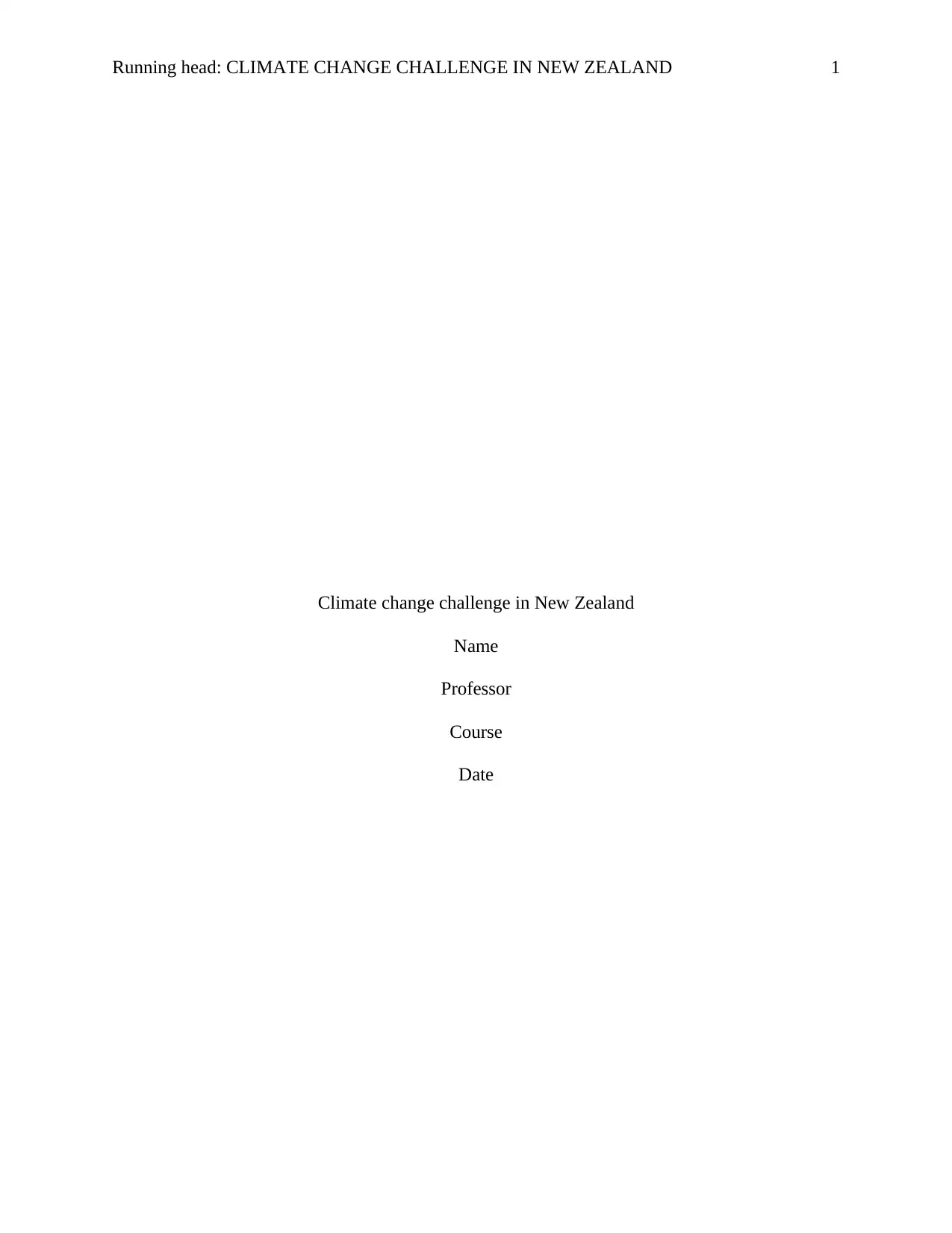
Running head: CLIMATE CHANGE CHALLENGE IN NEW ZEALAND 1
Climate change challenge in New Zealand
Name
Professor
Course
Date
Climate change challenge in New Zealand
Name
Professor
Course
Date
Paraphrase This Document
Need a fresh take? Get an instant paraphrase of this document with our AI Paraphraser
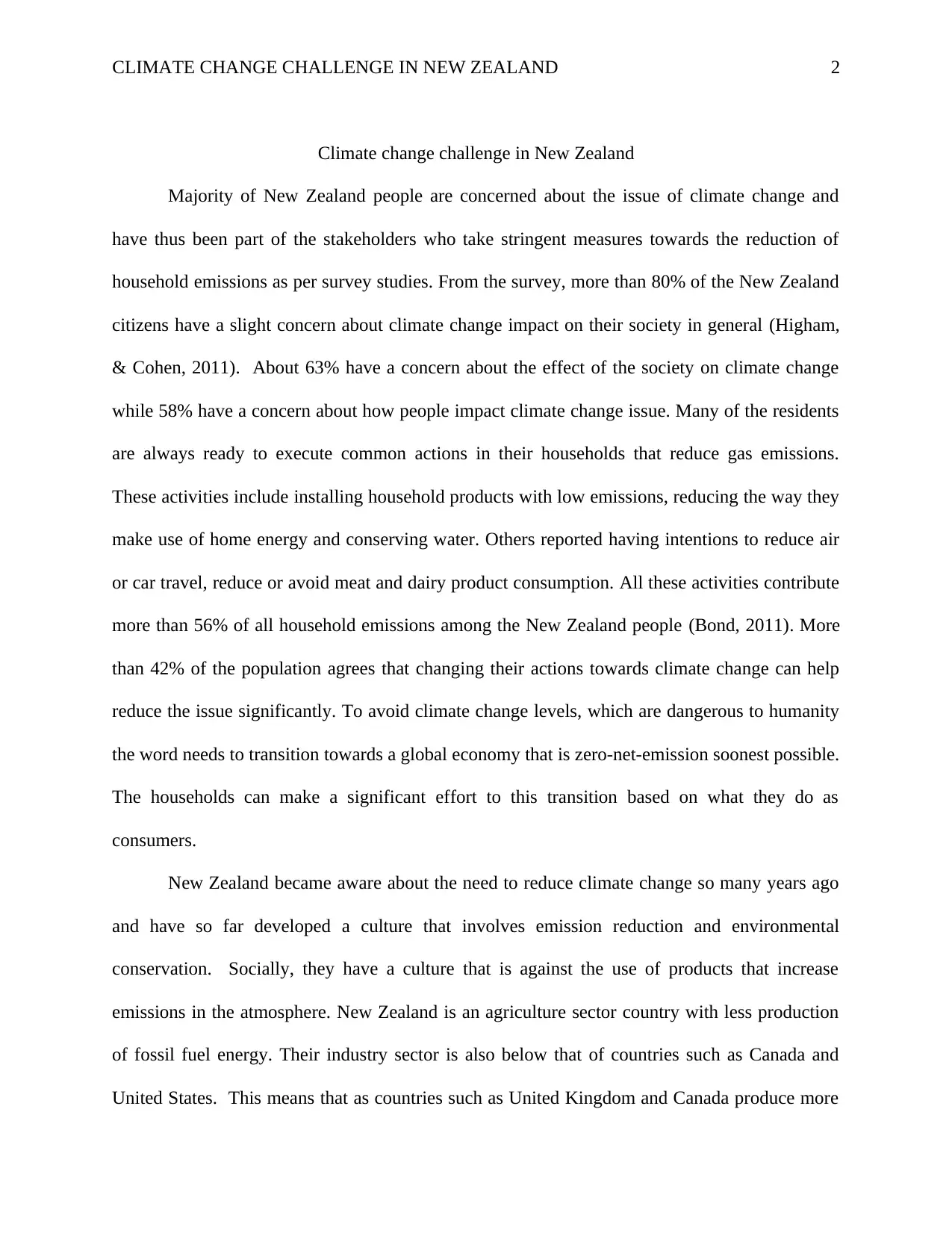
CLIMATE CHANGE CHALLENGE IN NEW ZEALAND 2
Climate change challenge in New Zealand
Majority of New Zealand people are concerned about the issue of climate change and
have thus been part of the stakeholders who take stringent measures towards the reduction of
household emissions as per survey studies. From the survey, more than 80% of the New Zealand
citizens have a slight concern about climate change impact on their society in general (Higham,
& Cohen, 2011). About 63% have a concern about the effect of the society on climate change
while 58% have a concern about how people impact climate change issue. Many of the residents
are always ready to execute common actions in their households that reduce gas emissions.
These activities include installing household products with low emissions, reducing the way they
make use of home energy and conserving water. Others reported having intentions to reduce air
or car travel, reduce or avoid meat and dairy product consumption. All these activities contribute
more than 56% of all household emissions among the New Zealand people (Bond, 2011). More
than 42% of the population agrees that changing their actions towards climate change can help
reduce the issue significantly. To avoid climate change levels, which are dangerous to humanity
the word needs to transition towards a global economy that is zero-net-emission soonest possible.
The households can make a significant effort to this transition based on what they do as
consumers.
New Zealand became aware about the need to reduce climate change so many years ago
and have so far developed a culture that involves emission reduction and environmental
conservation. Socially, they have a culture that is against the use of products that increase
emissions in the atmosphere. New Zealand is an agriculture sector country with less production
of fossil fuel energy. Their industry sector is also below that of countries such as Canada and
United States. This means that as countries such as United Kingdom and Canada produce more
Climate change challenge in New Zealand
Majority of New Zealand people are concerned about the issue of climate change and
have thus been part of the stakeholders who take stringent measures towards the reduction of
household emissions as per survey studies. From the survey, more than 80% of the New Zealand
citizens have a slight concern about climate change impact on their society in general (Higham,
& Cohen, 2011). About 63% have a concern about the effect of the society on climate change
while 58% have a concern about how people impact climate change issue. Many of the residents
are always ready to execute common actions in their households that reduce gas emissions.
These activities include installing household products with low emissions, reducing the way they
make use of home energy and conserving water. Others reported having intentions to reduce air
or car travel, reduce or avoid meat and dairy product consumption. All these activities contribute
more than 56% of all household emissions among the New Zealand people (Bond, 2011). More
than 42% of the population agrees that changing their actions towards climate change can help
reduce the issue significantly. To avoid climate change levels, which are dangerous to humanity
the word needs to transition towards a global economy that is zero-net-emission soonest possible.
The households can make a significant effort to this transition based on what they do as
consumers.
New Zealand became aware about the need to reduce climate change so many years ago
and have so far developed a culture that involves emission reduction and environmental
conservation. Socially, they have a culture that is against the use of products that increase
emissions in the atmosphere. New Zealand is an agriculture sector country with less production
of fossil fuel energy. Their industry sector is also below that of countries such as Canada and
United States. This means that as countries such as United Kingdom and Canada produce more
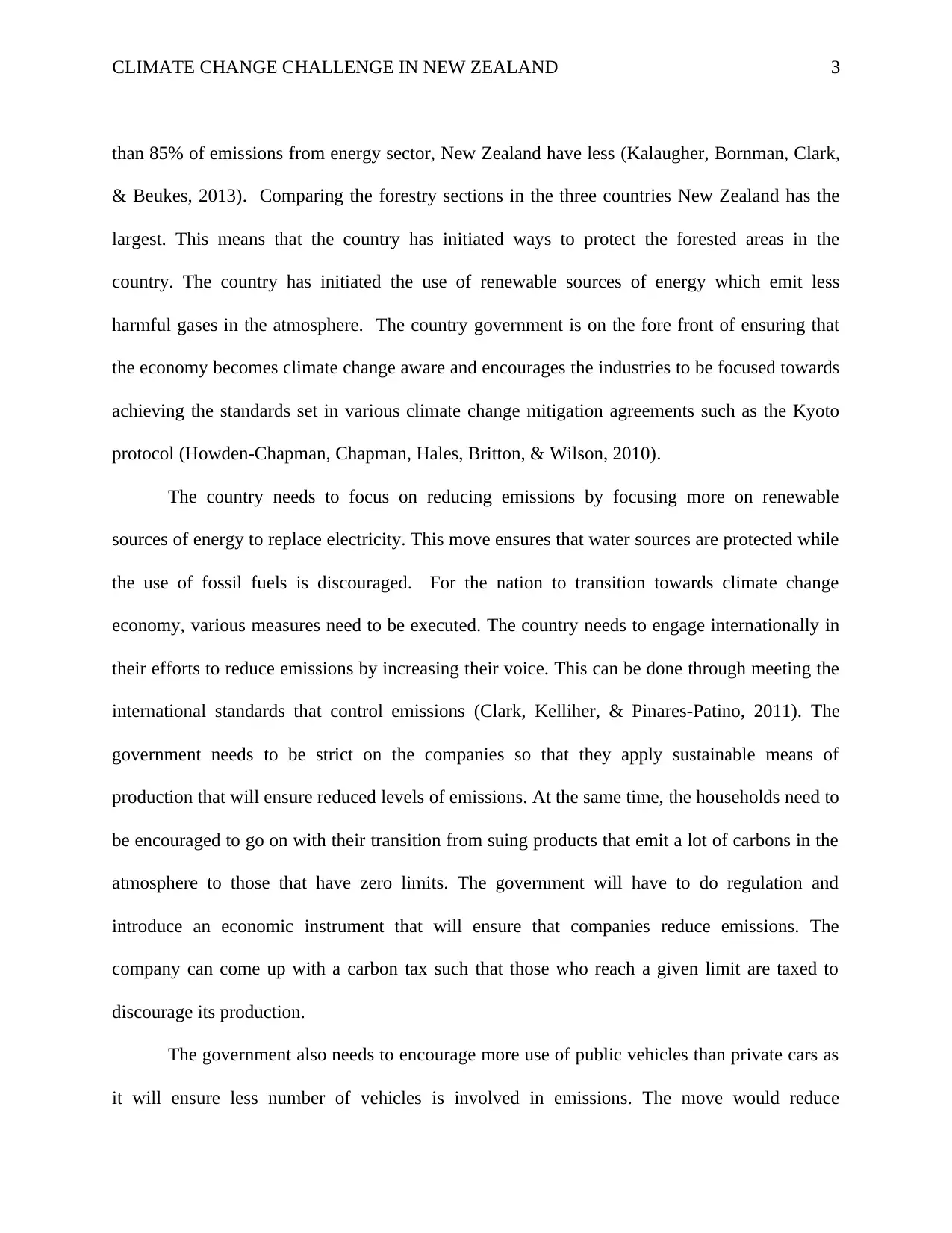
CLIMATE CHANGE CHALLENGE IN NEW ZEALAND 3
than 85% of emissions from energy sector, New Zealand have less (Kalaugher, Bornman, Clark,
& Beukes, 2013). Comparing the forestry sections in the three countries New Zealand has the
largest. This means that the country has initiated ways to protect the forested areas in the
country. The country has initiated the use of renewable sources of energy which emit less
harmful gases in the atmosphere. The country government is on the fore front of ensuring that
the economy becomes climate change aware and encourages the industries to be focused towards
achieving the standards set in various climate change mitigation agreements such as the Kyoto
protocol (Howden-Chapman, Chapman, Hales, Britton, & Wilson, 2010).
The country needs to focus on reducing emissions by focusing more on renewable
sources of energy to replace electricity. This move ensures that water sources are protected while
the use of fossil fuels is discouraged. For the nation to transition towards climate change
economy, various measures need to be executed. The country needs to engage internationally in
their efforts to reduce emissions by increasing their voice. This can be done through meeting the
international standards that control emissions (Clark, Kelliher, & Pinares-Patino, 2011). The
government needs to be strict on the companies so that they apply sustainable means of
production that will ensure reduced levels of emissions. At the same time, the households need to
be encouraged to go on with their transition from suing products that emit a lot of carbons in the
atmosphere to those that have zero limits. The government will have to do regulation and
introduce an economic instrument that will ensure that companies reduce emissions. The
company can come up with a carbon tax such that those who reach a given limit are taxed to
discourage its production.
The government also needs to encourage more use of public vehicles than private cars as
it will ensure less number of vehicles is involved in emissions. The move would reduce
than 85% of emissions from energy sector, New Zealand have less (Kalaugher, Bornman, Clark,
& Beukes, 2013). Comparing the forestry sections in the three countries New Zealand has the
largest. This means that the country has initiated ways to protect the forested areas in the
country. The country has initiated the use of renewable sources of energy which emit less
harmful gases in the atmosphere. The country government is on the fore front of ensuring that
the economy becomes climate change aware and encourages the industries to be focused towards
achieving the standards set in various climate change mitigation agreements such as the Kyoto
protocol (Howden-Chapman, Chapman, Hales, Britton, & Wilson, 2010).
The country needs to focus on reducing emissions by focusing more on renewable
sources of energy to replace electricity. This move ensures that water sources are protected while
the use of fossil fuels is discouraged. For the nation to transition towards climate change
economy, various measures need to be executed. The country needs to engage internationally in
their efforts to reduce emissions by increasing their voice. This can be done through meeting the
international standards that control emissions (Clark, Kelliher, & Pinares-Patino, 2011). The
government needs to be strict on the companies so that they apply sustainable means of
production that will ensure reduced levels of emissions. At the same time, the households need to
be encouraged to go on with their transition from suing products that emit a lot of carbons in the
atmosphere to those that have zero limits. The government will have to do regulation and
introduce an economic instrument that will ensure that companies reduce emissions. The
company can come up with a carbon tax such that those who reach a given limit are taxed to
discourage its production.
The government also needs to encourage more use of public vehicles than private cars as
it will ensure less number of vehicles is involved in emissions. The move would reduce
⊘ This is a preview!⊘
Do you want full access?
Subscribe today to unlock all pages.

Trusted by 1+ million students worldwide
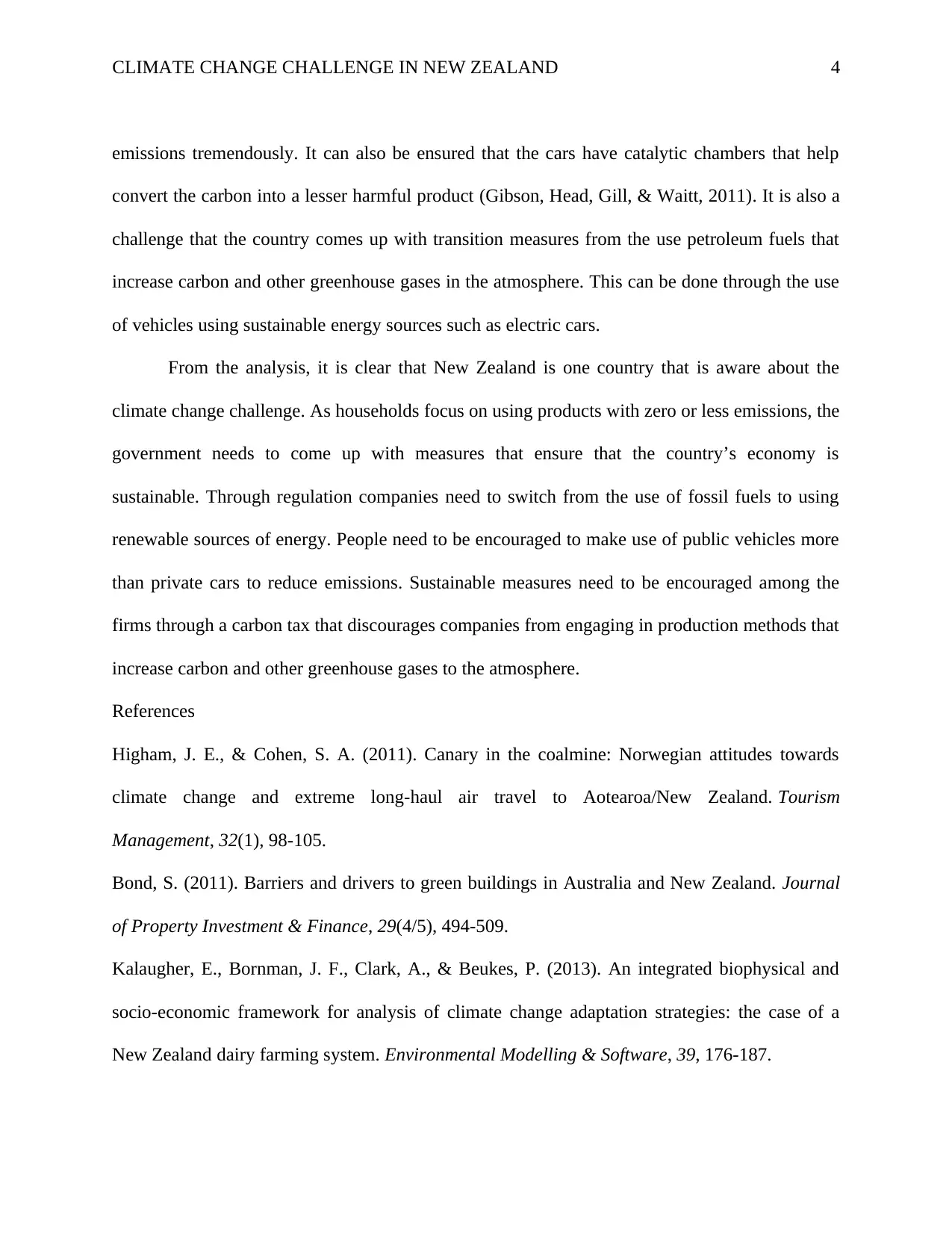
CLIMATE CHANGE CHALLENGE IN NEW ZEALAND 4
emissions tremendously. It can also be ensured that the cars have catalytic chambers that help
convert the carbon into a lesser harmful product (Gibson, Head, Gill, & Waitt, 2011). It is also a
challenge that the country comes up with transition measures from the use petroleum fuels that
increase carbon and other greenhouse gases in the atmosphere. This can be done through the use
of vehicles using sustainable energy sources such as electric cars.
From the analysis, it is clear that New Zealand is one country that is aware about the
climate change challenge. As households focus on using products with zero or less emissions, the
government needs to come up with measures that ensure that the country’s economy is
sustainable. Through regulation companies need to switch from the use of fossil fuels to using
renewable sources of energy. People need to be encouraged to make use of public vehicles more
than private cars to reduce emissions. Sustainable measures need to be encouraged among the
firms through a carbon tax that discourages companies from engaging in production methods that
increase carbon and other greenhouse gases to the atmosphere.
References
Higham, J. E., & Cohen, S. A. (2011). Canary in the coalmine: Norwegian attitudes towards
climate change and extreme long-haul air travel to Aotearoa/New Zealand. Tourism
Management, 32(1), 98-105.
Bond, S. (2011). Barriers and drivers to green buildings in Australia and New Zealand. Journal
of Property Investment & Finance, 29(4/5), 494-509.
Kalaugher, E., Bornman, J. F., Clark, A., & Beukes, P. (2013). An integrated biophysical and
socio-economic framework for analysis of climate change adaptation strategies: the case of a
New Zealand dairy farming system. Environmental Modelling & Software, 39, 176-187.
emissions tremendously. It can also be ensured that the cars have catalytic chambers that help
convert the carbon into a lesser harmful product (Gibson, Head, Gill, & Waitt, 2011). It is also a
challenge that the country comes up with transition measures from the use petroleum fuels that
increase carbon and other greenhouse gases in the atmosphere. This can be done through the use
of vehicles using sustainable energy sources such as electric cars.
From the analysis, it is clear that New Zealand is one country that is aware about the
climate change challenge. As households focus on using products with zero or less emissions, the
government needs to come up with measures that ensure that the country’s economy is
sustainable. Through regulation companies need to switch from the use of fossil fuels to using
renewable sources of energy. People need to be encouraged to make use of public vehicles more
than private cars to reduce emissions. Sustainable measures need to be encouraged among the
firms through a carbon tax that discourages companies from engaging in production methods that
increase carbon and other greenhouse gases to the atmosphere.
References
Higham, J. E., & Cohen, S. A. (2011). Canary in the coalmine: Norwegian attitudes towards
climate change and extreme long-haul air travel to Aotearoa/New Zealand. Tourism
Management, 32(1), 98-105.
Bond, S. (2011). Barriers and drivers to green buildings in Australia and New Zealand. Journal
of Property Investment & Finance, 29(4/5), 494-509.
Kalaugher, E., Bornman, J. F., Clark, A., & Beukes, P. (2013). An integrated biophysical and
socio-economic framework for analysis of climate change adaptation strategies: the case of a
New Zealand dairy farming system. Environmental Modelling & Software, 39, 176-187.
Paraphrase This Document
Need a fresh take? Get an instant paraphrase of this document with our AI Paraphraser
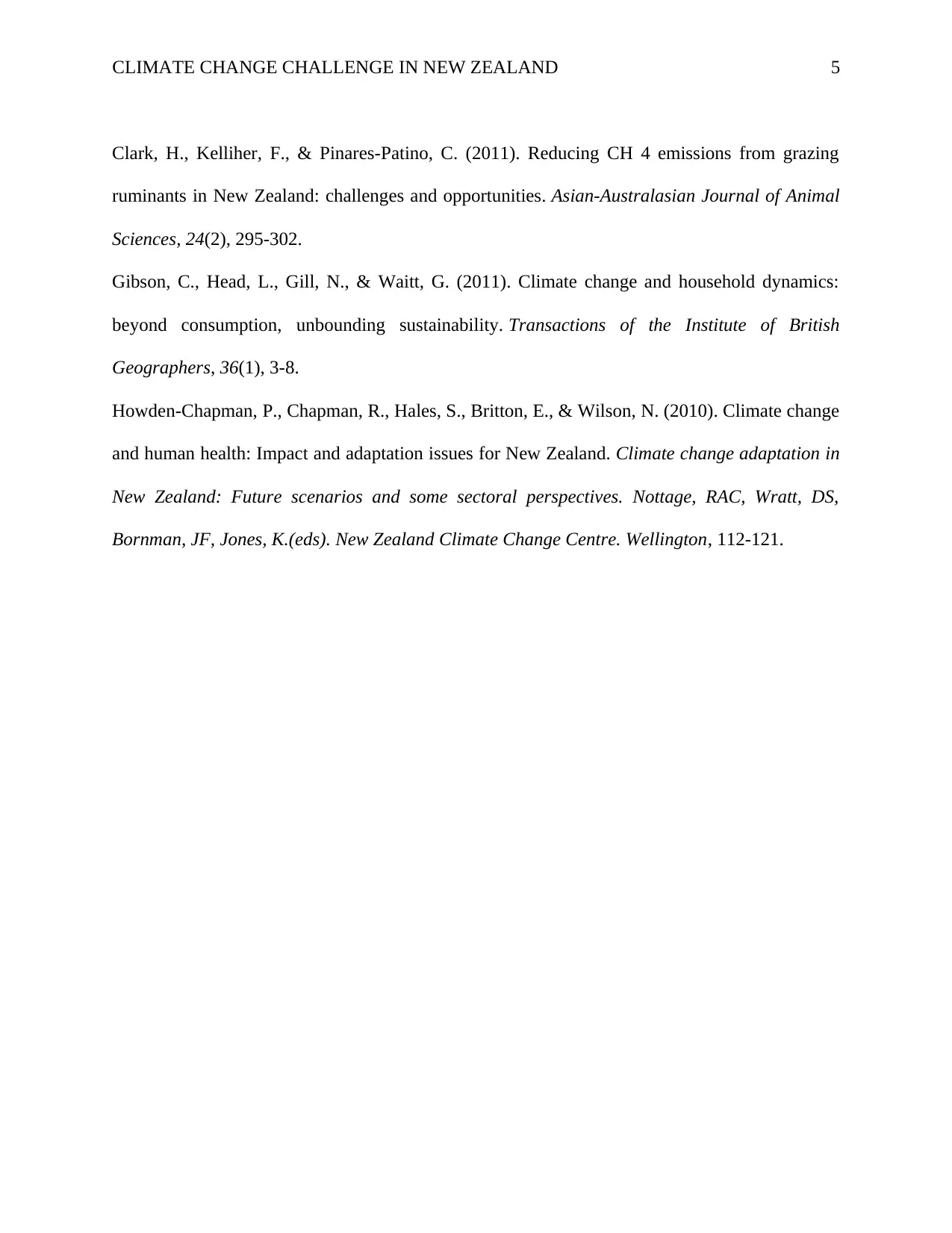
CLIMATE CHANGE CHALLENGE IN NEW ZEALAND 5
Clark, H., Kelliher, F., & Pinares-Patino, C. (2011). Reducing CH 4 emissions from grazing
ruminants in New Zealand: challenges and opportunities. Asian-Australasian Journal of Animal
Sciences, 24(2), 295-302.
Gibson, C., Head, L., Gill, N., & Waitt, G. (2011). Climate change and household dynamics:
beyond consumption, unbounding sustainability. Transactions of the Institute of British
Geographers, 36(1), 3-8.
Howden-Chapman, P., Chapman, R., Hales, S., Britton, E., & Wilson, N. (2010). Climate change
and human health: Impact and adaptation issues for New Zealand. Climate change adaptation in
New Zealand: Future scenarios and some sectoral perspectives. Nottage, RAC, Wratt, DS,
Bornman, JF, Jones, K.(eds). New Zealand Climate Change Centre. Wellington, 112-121.
Clark, H., Kelliher, F., & Pinares-Patino, C. (2011). Reducing CH 4 emissions from grazing
ruminants in New Zealand: challenges and opportunities. Asian-Australasian Journal of Animal
Sciences, 24(2), 295-302.
Gibson, C., Head, L., Gill, N., & Waitt, G. (2011). Climate change and household dynamics:
beyond consumption, unbounding sustainability. Transactions of the Institute of British
Geographers, 36(1), 3-8.
Howden-Chapman, P., Chapman, R., Hales, S., Britton, E., & Wilson, N. (2010). Climate change
and human health: Impact and adaptation issues for New Zealand. Climate change adaptation in
New Zealand: Future scenarios and some sectoral perspectives. Nottage, RAC, Wratt, DS,
Bornman, JF, Jones, K.(eds). New Zealand Climate Change Centre. Wellington, 112-121.
1 out of 5
Related Documents
Your All-in-One AI-Powered Toolkit for Academic Success.
+13062052269
info@desklib.com
Available 24*7 on WhatsApp / Email
![[object Object]](/_next/static/media/star-bottom.7253800d.svg)
Unlock your academic potential
Copyright © 2020–2025 A2Z Services. All Rights Reserved. Developed and managed by ZUCOL.





